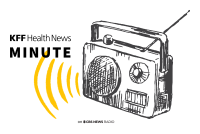Latest Morning Briefing Stories
Listen to the Latest ‘KFF Health News Minute’
The “KFF Health News Minute” brings original health care and health policy reporting from our newsroom to the airwaves each week.
Even Patients Are Shocked by the Prices Their Insurers Will Pay — And It Costs All of Us
Health care prices are on the rise, and patients are flummoxed that even insurance companies aren’t doing more to control costs.
Readers Lean On Congress To Solve Crises in Research and Rehab
KFF Health News gives readers a chance to comment on a recent batch of stories.
Federal Aid for Lead Cleanup Is Receding. That’s a Problem for Cash-Strapped Cities.
Congress and the Trump administration are rolling back some lead remediation resources. Case studies of two cities and a state that faced lead contamination problems could give cash-strapped cities ideas of how to address such pollution themselves.
Families Defend Disability Services Amid Medicaid Cuts
Idaho is positioning to slash Medicaid funding as state lawmakers grapple with the effects of the federal One Big Beautiful Bill Act, which President Donald Trump signed into law last year. On the table are in-home care services.
Medicaid Is Paying for More Dental Care. GOP Cuts Threaten To Reverse the Trend.
More than three dozen states cover dental services for low-income and disabled individuals on Medicaid, in recognition of such care’s importance to overall health. But with about $900 billion in funding cuts expected to hit states over the next decade, many programs could roll back dental coverage.
To Avoid Care Disruptions, Know When the Clock Runs Out on Your Prior Authorization
A Massachusetts woman knew the medicine her doctor prescribed required preauthorization, but she didn’t realize the approval had an expiration date. It took nearly three weeks of phone calls and paperwork to get her prescription refilled.
He Needs an Expensive Drug. A Copay Card Helped — Until It Didn’t.
Diagnosed with an autoimmune disorder, a California man was prescribed a drug that costs thousands of dollars a month. He said he was reassured that the drugmaker’s copay card would cover his share, but after two months, the card was empty.
‘You Aren’t Trapped’: Hundreds of US Nurses Choose Canada Over Trump’s America
More than 1,000 American nurses have successfully applied for licensure in British Columbia since April, a massive increase over prior years. Ontario and Alberta have also seen more interest from Americans.
‘Kind of Morbid’: Health Premiums Threaten Their Nest Egg. A Terminal Diagnosis May Spare It.
Chaz and Jean Franklin were facing a sevenfold increase in their health premium payments with the expiration of enhanced federal subsidies for Affordable Care Act plans at the end of 2025. Then Jean received a crushing diagnosis that will claim her life but save the couple money.
Democrats Decry Meager Medical Care for Detainees in Funding Fight
A growing body of evidence indicates that immigrants in the custody of Immigration and Customs Enforcement face medical consequences because of serious gaps in basic health care services. It’s adding to the political backlash against the Trump administration’s aggressive deportation policies.
Hospitals Fighting Measles Confront a Challenge: Few Doctors Have Seen It Before
As the number of cases grows to about 1,000 in the Carolinas, health care workers who’ve never seen the vaccine-preventable disease can get caught by surprise.
As More Americans Embrace Anxiety Treatment, MAHA Derides Medications
Robert F. Kennedy Jr. has criticized the broadening use of anxiety medications, claiming they’re harmful. Doctors and researchers say the MAHA movement is misrepresenting drugs that have been proved to safely treat chronic anxiety and point to broader social changes to explain their increased use.
New Orleans Brings Back the House Call, Sending Nurses To Visit Newborns and Moms
Louisiana is one of the worst-performing states when it comes to health outcomes of mothers and infants. New Orleans is trying to catch health issues early and get families off to an easier start by adding health visits during the crucial first months of life.
State Lawmakers Seek Restraints on Wage Garnishment for Medical Debt
At least eight states are considering legislation to curtail wage garnishment over unpaid medical bills, as health care costs rise and more people become underinsured.
When It Comes to Health Insurance, Federal Dollars Support More Than ACA Plans
Questions of fairness came up in last year’s congressional debate about extending Obamacare’s enhanced subsidies. Critics wondered why the federal government should underwrite coverage costs for people with ACA coverage. In truth, though, almost all health insurance in the U.S. comes with some federal help.
Should Drug Companies Be Advertising to Consumers?
Aging means “becoming a target” of the industry, one expert said. After decades of debate, politicians of all stripes are proposing bans.
Nevada Debuts Public Option Amid Tumultuous Federal Changes to Health Care
The state recently became the third to offer a public option health plan through its Affordable Care Act marketplace. But researchers said it’s unlikely to fill the gaps left by sweeping changes at the federal level.
An Arm and a Leg: Personal Finance Guru Faces Down an Insurance Denial
Ron Lieber, the “Your Money” columnist for The New York Times, shares ideas about how insurance companies, doctors, and patients can better handle prior authorization denials.
Wyoming Wants To Make Its Five-Year Federal Rural Health Funding Last ‘Forever’
State officials believe they’ve found a way to extend the life of federal Rural Health Transformation Program money Wyoming is receiving as part of last summer’s One Big Beautiful Bill Act — by investing most of it.


























